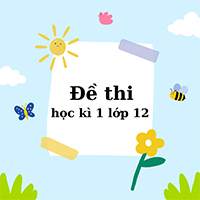Từ vựng Unit 3 lớp 12 Ways of Socialising
Từ vựng tiếng Anh 12 Unit 3 Ways Of Socialising gồm toàn bộ từ mới tiếng Anh quan trọng có trong các bài học (lesson) trong Unit 3 lớp 12 như: Reading; Speaking; Listening, Writing và Language focus giúp các em học sinh lớp 12 ôn tập kiến thức Từ vựng tiếng Anh hiệu quả..
Từ vựng Tiếng Anh Unit 3 lớp 12 Ways of socialising
- A. Reading trang 20 21 22 SGK tiếng Anh 12 Unit 2
- B. Speaking trang 22 23 24 SGK tiếng Anh 12 Unit 2
- C. Listening trang 24 25 SGK tiếng Anh 12 Unit 2
- D. Writing trang 25 26 SGK tiếng Anh 12 Unit 2
- E. Language Focus trang 27 28 29 SGK tiếng Anh 12 Unit 2
- Bài tập Từ vựng unit 3 lớp 12 Ways of socialising có đáp án
A. Reading trang 20 21 22 SGK tiếng Anh 12 Unit 2
| Từ mới | Phiên âm | Định nghĩa |
| 1. social | (adj) /'sou∫l/ | thuộc xã hội |
| 2. society | (n) /sə'saiəti/ | xã hội |
| 3. to socialise | (v) /ˈsəʊʃəlaɪz/ | xã hội hóa |
| 4. to attract sb's attention | (v) /əˈtrækt/ | gây (thu hút) sự chú ý của ai |
| 5. verbal | (adj) /'və:bl/ | bằng lời, hữu ngôn |
| 6 non-verbal | (a) /ˌnɒn ˈvɜːbl/ | phi ngôn |
| 7. informal = friendly | (adj) /in'fɔ:ml/ | thân mật |
| 8. formal | (adj) /'fɔ:ml/ | trịnh trọng |
| 9. informality | (n) /in'fɔ:mliti/ | sự thân mật |
| 10. nod | (v) /nɒd/ | gật đầu |
| 11. approach | (v) /ə'prout∫/ | lại gần, đến gần |
| 12. communication | (n) /kə,mju:ni'kei∫n/ | sự giao tiếp |
| 13. to communicate | (v) /kə'mju:nikeit/ | giao tiếp |
| 14. common | (adj) /ˈkɒmən/ | thông thường, phổ biến |
| 15. to wave | (v) /weɪv/ | vẫy tay |
| 16. to raise one's hands | (v) /reɪz/ | giơ tay |
| 17. signal | (n) /'signəl/ | dấu hiệu |
| 18. to get off | (v) | xuống (xe) |
| 19. to get on | (v) | lên (xe) |
| 20. to be excited | (v) /ɪkˈsaɪtɪd/ | phấn khích |
| 21. to jump up and down | (v) /dʒʌmp/ | nhảy lên |
| 22. instance | (n) /'instəns/ | trường hợp |
| 23. for instance | /'instəns/ | ví dụ, chẳng hạn |
| 24. obvious | (adj) /'ɒbviəs/ | rõ ràng, hiển nhiên |
| 25. obviously | (adv) /'ɒbviəsli/ | rõ ràng, hiển nhiên |
| 26. appropriate | (adj) /ə'proupriət/ | thích hợp |
| 27. choice | (n) /t∫ɔis/ | sự lựa chọn |
| 28. to choose –chose-chosen | (v) /tʃuːz/ | lựa chọn |
| 29. to pass | (v) /pɑːs/ | đi ngang qua |
| 30. to catch one's eye | (v) /kætʃ/ | bắt gặp ánh mắt của ai |
| 31. slightly | (adj) /'slaitli/ | nhẹ nhàng |
| 32. to whistle | (v) /wisl/ | húyt sáo |
| 33. to rude to sb | (v) /ruːd/ | khiếm nhã, bất lịch sự với ai |
B. Speaking trang 22 23 24 SGK tiếng Anh 12 Unit 2
| Từ mới | Phiên âm | Định nghĩa |
| 1. terrfic =excellent, wonderful | (adj) /tə'rifik/ | tuyệt vời |
| 2. decent | (adj) /'di:snt/ | đứng đắn, chỉnh tề |
| 3. handle | (v) /'hændl/ | sử dụng, sờ,(vấn tóc lên) |
| 4. kid = joke | /kid/ | nói đùa |
| 5. tune | (n) /tjuːn/ | giai điệu |
| 6. respond | (v) /ri'spɔnd/ | đáp lại |
| 7. compliment | (n) /'kɔmplimənt/ | lời khen ngợi |
| 8. blouse | (n) /blauz/ | áo cánh |
| 9. style | (n) /staɪl/ | kiểu |
| 10. hairstyle | (n) /ˈheəstaɪl/ | kiểu tóc |
| 11. to suit | (v) /sju:t/ | hợp với |
| 12. badminton | (n) /ˈbædmɪntən/ | môn cầu lông |
| 13. public speaking | (n) | nghệ thuật diễn thuyết, tài ăn nói |
| 14. a pair of glasses | (n) /ˈɡlɑːsɪz/ | một cặp mắt kính |
C. Listening trang 24 25 SGK tiếng Anh 12 Unit 2
| Từ mới | Phiên âm | Định nghĩa |
| 1. marvelous | (adj) /'mɑ:vələs]/ | tuyệt vời |
| 2. argument | (n) /ˈɑːɡjumənt/ | sự tranh luận |
| 3. to argue with sb about sth | (v) /ˈɑːɡjuː/ | tranh luận |
| 4. to install | (v) /in'stɔ:l]/ | lắp đặt |
| 5. regulation | (n) /,regju'lei∫n/ | qui tắc, nội quy |
| 6. shank | (n) /∫æηk/ | thân cột, chuôi dao, tay chèo |
| 7. the shank of the evening | (adv) | lúc sẩm tối |
| 8. apoplectic | (adj) /,æpə'plektik/ | hối lỗi, ân hận |
| 9. startling | (adj) /'stɑ:tliη/ | rất ngạc nhiên, làm sửng sốt |
| 10. to startle | (v) /'stɑ:tl/ | ngạc nhiên, sửng sốt |
| 11. social worker | (n) | người làm công tác xã hội |
| 12. battleground | (n) /'bætlgraund/ | đầu đề tranh luận |
| 13. some pieces of advice | (n) | một vài lời khuyên |
| 14. instrument | (n) /'instrumənt/ | nhạc cụ |
| 15. to talk sth over | (v) | thảo luận cái gì |
| 16. reasonable | (adj) /'ri:znəbl/ | hợp lý |
| 17. a length of time | (n) | một lượng thời gian (dùng vào việc gì) |
| 18. the exact duration | (n) /djuˈreɪʃn/ | khoảng thời gian chính xác |
| 19. to work out | (v) /wɜːk/ | tính tóan cái gì; vạch ra |
| 20. absolute | (adj) /'æbsəlu:t/ | hoàn toàn |
| 21. absolutely | (adv) /'æbsəlu:tli/ | hoàn toàn |
| 22. maximum | (n) /'mæksiməm/ | tối đa |
| 23. minimum | (n) /'miniməm/ | tối thiểu |
| 24. to limit | (v) /ˈlɪmɪt/ | giới hạn, hạn chế |
| 25. to be agreed upon | (v) | đạt tới một sự đồng ý |
| 26. to object to | (v) /'ɔbdʒikt/ | phản đối |
| 27. serious | (adj) /'siəriəs/ | nghiêm trọng |
| 28. seriously | (adv) /'siəriəsli/ | nghiêm trọng |
| 29. particular | (adj) /pə'tikjulə(r)/ | đặt biệt, riêng biệt |
| 30. shock | (v,n) /∫ɔk/ | sốc, cú sốc |
| 31. to wake up | (v) /weɪk/ | thức dậy |
| 32. a sound sleep | (n) /sliːp/ | một giấc ngủ ngon |
| 33. fright | (n) /frait/ | sự hoảng sợ |
| 34. frighten | (v) /ˈfraɪtn/ | làm hỏang sợ |
| 35. instant thought | (n) //ˈɪnstənt θɔːt/ | ý nghĩ tức thì |
| 36. a heart attack | (n) /ˈhɑːt ətæk/ | một cơn đau tim |
| 37. out of kindness | /ˈkaɪndnəs/ | vì lòng tốt |
| 38. separate | (adj) /'seprət/ | riêng biệt |
D. Writing trang 25 26 SGK tiếng Anh 12 Unit 2
| Từ mới | Phiên âm | Định nghĩa |
| 1. apologize to sb for sth | (v) /ə'pɔlədʒaiz/ | xin lỗi ai về điều gì |
| 2. to make /offer an apology for sth | (v) /əˈpɒlədʒi/ | xin lỗi ai về điều gì |
| 3. abrupt | (adj) /ə'brʌpt/ | đột ngột |
| 4. abruptly | (adv) /ə'brʌptli/ | đột ngột |
| 5. thoughtful | (adj) /'θɔ:tfl/ | ân cần, chu đáo |
| 6. discourtesy | (n) /dis'kə:tisi/ | sự bất lịch sự, sự khiếm nhã |
| 7. interruption | (n) /,intə'rʌp∫n/ | sự gián đọan; vật gây gián đọan |
| 8. addition | (n) /ə'di∫n/ | sự thêm vào |
| 9. omission | (n) /'omi∫n/ | sự bỏ đi |
| 10. to omit | (v) /o'mit/ | bỏ sót, bỏ đi |
| 11. to require | (v) /ri'kwaiə/ | yêu cầu, đòi hỏi |
| 12. to depend on | (v) /dɪˈpend/ | lệ thuộc vào |
| 13. at hand | /hænd/ | sắp đến, sắp tới |
| 14. to observe | (v) /ə'bzə:v/ | quan sát |
| 15. departure | (n) /di'pɑ:t∫ə/ | sự ra đi, sự khởi hành |
| 16. to lead into | (v) /liːd/ | đưa vào, dẫn vào |
| 17. farewell | (n) /,feə'wel/ | lời chào tạm biệt |
| 18. to relate to | (v) | liên quan đến |
| 19. order | (n) /'ɔ:də/ | thứ tự, trình tự |
| 20. to order | (v) /'ɔ:də/ | yêu cầu, ra lệnh |
| 21. re-ordered | (adj) /ˌriːˈɔːdə(r)/ | được sắp xếp lại |
| 22. to indicate | (v) /'indikeit/ | chỉ, cho biết |
| 23. to make a mistake | (v) /mɪˈsteɪk/ | phạm lỗi |
| 24. to be sorry for sth | (v) /ˈsɒri/ | rất hổ thẹn và hối hận (việc đã qua) |
| 25. to admit | (v) /əd'mit/ | thừa nhận |
| 26. wrongdoing | (n) /ˈrɒŋduːɪŋ/ | hành vi sai trái |
| 27. to hurt someone's feeling | (v) /hɜːt/ | chạm lòng tự ái của ai |
| 28. to ask permission | (n) /pə'mi∫n/ | xin phép |
| 29. to take a seat | (v) /siːt/ | ngồi lên gối |
| 30. action | (n) /'æk∫n/ | hành động |
| 31. naturally | (adv) /'næt∫rəli/ | đương nhiên, tất nhiên |
| 32. to cause | (v) /kɔ:z/ | gây ra |
| 33. to be late for class/ school | (v) /leɪt/ | đến lớp trễ, đi học trễ |
E. Language Focus trang 27 28 29 SGK tiếng Anh 12 Unit 2
| Từ mới | Phiên âm | Định nghĩa |
| 1. marketing manager | (n) /ˈmɑːkɪtɪŋ ˈmænɪdʒə(r)/ | giám đốc tiếp thị |
| 2. successful | (adj) /sək'sesfl/ | thành công |
| 3. to succeed | (v) /sək'si:d/ | thành công |
| 4. successfully | (adv) /səkˈsesfəli/ | thành công |
| 5. success | (n) /səkˈses/ | sự thành công |
| 6. to run an office | (v) | quản lý một văn phòng |
| 7. to be angry with sb | (v) /ˈæŋɡri/ | giận ai |
| 8. not...any more = no longer | không còn nữa | |
| 9. to be upset | (adj) /ʌp'set / | lo lắng, bối rối |
| 10. to promise | (v) /'prɔmis/ | hứa |
| 11. to turn up = to arrive | (v) /tɜːn ʌp/ | đến |
| 12. to break down | (v) /breɪk daʊn/ | bị nạn, bị hỏng (xe) |
| 13. to get through (to sb) | /ɡet θruː/ | liên lạc (với ai) qua điện thọai |
| 14. otherwise | (conj) /ˈʌðəwaɪz/ | nếu không |
| 15. to forgive | (v) fə'giv | tha thứ |
| 16. sarcastic | (adj) /sɑ:'kæstik/ | chế nhạo, mỉa mai, châm biếm |
| 17. to owe | (v) /əʊ/ | mắc nợ, nợ |
Bài tập Từ vựng unit 3 lớp 12 Ways of socialising có đáp án
I. Choose A, B, C, or D that best completes each unfinished sentence.
Câu 1: She is a kind of woman who does not care much of work but generally _______ meals, movies or late nights at a club with her colleagues.
A. supposes
B. discusses
C. attends
D. socialises
Câu 2: I didn't think his comments were very appropriate at the time.
A. correct
B. right
C. suitable
D. exact
Câu 3: Body language is a potent form of _______ communication.
A. verbal
B. non-verbal
C. tongue
D. oral
Câu 4: This is the instance where big, obvious non-verbal signals are appropriate.
A. matter
B. attention
C. place
D. situation
Câu 5: The lecturer explained the problem very clearly and is always _______ in response to questions.
A. attention
B. attentively
C. attentive
D. attentiveness
II. Choose a, b, c, or d that best completes each unfinished sentence, substitutes the underlined part, or has a close meaning to the original one.
1. Our teacher often said, "Who knows the answer? _______ your hand."
a. Rise
b. Lift
c. Raise
d. Heighten
2. They started, as _______ gatherings but they have become increasingly formalized in the last few years.
a. informal
b. informally
c. informalize
d. informality
3. Children who are isolated and lonely seem to have poor language and ________.
a. communicate
b. communication
c. communicative
d. communicator
4. The boy waved his hands to his mother, who was standing at the school gate, to _______ her attention.
a. attract
b. pull
c. follow
d. tempt
5. After a _______ hesitation, she began to speak with such a convincing voice.
a. rude
b. slight
c. small
d. impolite
6. He is one of the most _______ bosses I have ever worked with. He behaves rudely to not only me but also others in the staff.
a. thoughtful
b. impolite
c. attentive
d. communicative
III. Choose the word which is stressed differently from the rest.
1. A. begin B. visit C. consist D. include
2. A. cancer B. treatment C. tissue D. disease
3. A. begin B. visit C. become D. release
4. A. combine B. visit C. occur D. emit
5. A. carriage B. custom C. decree D. success
6. A. without B. doctor C. pasture D. cover
7. A. decide B. expect C. extra D. believe
8. A. extreme B. able C. poison D. drainage
9. A. goodbye B. except C. themselves D. gesture
IV. Complete the sentences with the correct form of words in the box
formal; polite; verbal; assist; apologise;
1. We are very .............. about the mistake we'd made.
2. Some people think it is ............ to ask someone's age.
3. ............. communication uses other methods, such as body language including facial expressions, gestures, and other body movements.
4. The ............ of a new computer system will take about a week
5. We can raise our hand slightly to show that we need ................
Đáp án
I. Choose A, B, C, or D that best completes each unfinished sentence.
1 - D; 2 - C; 3 - B; 4 - D; 5 - C;
II. Choose a, b, c, or d that best completes each unfinished sentence, substitutes the underlined part, or has a close meaning to the original one.
1 - c; 2 - a; 3 - b; 4 - a; 5 - b; 6 - b;
III. Choose the word which is stressed differently from the rest.
1 - B; 2 - D; 3 - B; 4 - B; 5 - D; 6 - A; 7 - C; 8 - B; 9 - D;
IV. Complete the sentences with the correct form of words in the box
formal; polite; verbal; assist; apologise;
1. We are very .......apologetic....... about the mistake we'd made.
2. Some people think it is .......impolite..... to ask someone's age.
3. .......Nonverbal...... communication uses other methods, such as body language including facial expressions, gestures, and other body movements.
4. The .....installation....... of a new computer system will take about a week
5. We can raise our hand slightly to show that we need ..........assistance......
Thực hiện bài trắc nghiệm từ vựng tại: Trắc nghiệm từ vựng Unit 3 lớp 12: Ways Of Socialising hệ 7 năm MỚI
Trên đây là Từ mới tiếng Anh 12 sách cũ Unit 3 Ways of Socialising. Mời bạn đọc tham khảo thêm nhiều tài liệu ôn tập Tiếng Anh 12 khác nhau được cập nhật liên tục trên VnDoc.com.
* Bài tiếp theo: Ngữ pháp Tiếng Anh lớp 12 Unit 3: Ways of Socialising










